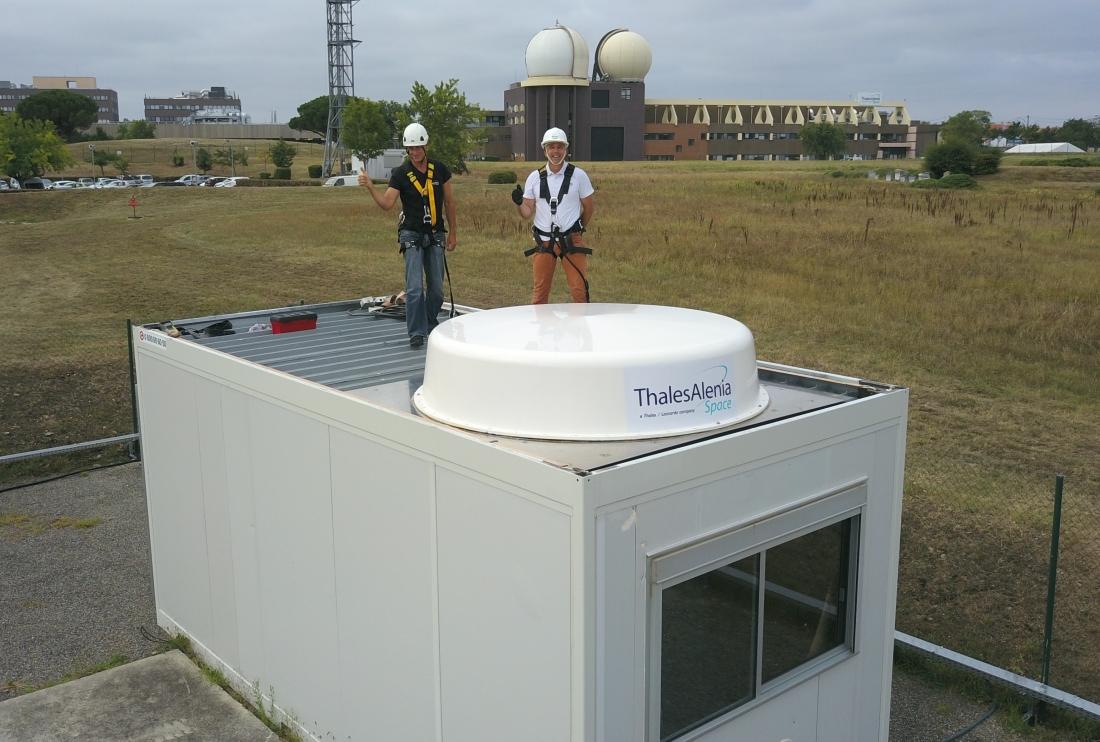- The European Commission (EC) has awarded Thales Alenia Space a contract for a ground station as an operational part of the SAR/Galileo search & rescue system.
- The contract includes one MEOLUT (Medium Orbit Local User Terminal), engineering support and maintenance services for one year, and the hosting site on La Reunion Island.
- Using Thales Alenia Space’s powerful and compact MEOLUT Next phased array solution, the EC and GSA (European GNSS Agency) will improve their contribution to the Cospas-Sarsat system
Cannes, October 8, 2018 - Thales Alenia Space, Joint Venture between Thales (67 %) and Leonardo (33 %), has won a contract from the European Commission to develop and build an operational ground station on La Reunion Island to track Global Navigation Satellite System (GNSS) satellites* in medium Earth orbit (MEO). The ground station will receive and process 406 MHz distress beacon signals from the MEO satellites being tracked, and relay them to the SAR/Galileo network via the French Mission Control Center (FMCC) at the CNES facility in Toulouse. The contract also included the procurement of the best possible hosting site for this ground station.
This MEOLUT Next will enhance the Commission’s contribution to the Cospas/Sarsat Search And Rescue system by extending its coverage in the South Indian ocean, contributing to worldwide coverage. It complements the three MEOLUTs that are already deployed around Europe, in Larnaca (Cyprus), Maspalomas (Grand Canaria) and Spitzbergen (Norway) and are under responsibility of the GSA.
The MEO system, which replaces the legacy LEO (low Earth orbit) system, is designed to offer a faster response and better location data in near real time for search & rescue (SAR) authorities, using spacecraft and ground facilities to detect and locate signals from the 406 MHz distress beacons.

The MEOLUT Next will also support the second generation of Cospas-Sarsat beacons. The SAR/Galileo site on La Reunion will be fitted with reference and calibration beacons to monitor the performance of the extended SAR ground segment and precisely calibrate MEOLUT measurements.
“Using Thales Alenia Space’s powerful and compact MEOLUT Next phased array solution, the European Commission will benefit from the world’s first spaceborne search & rescue system of this type,” said Philippe Blatt, Vice President, Navigation France at Thales Alenia Space. “We are very proud that our advanced technology is now recognized by many customers worldwide. The performance logged by our MEOLUT Next units in service far exceeds requirements, which not only benefits our customer countries, but also makes travel even safer. It’s worth remembering that the Cospas-Sarsat system, operational since 1988, saves some 1,500 lives a year.”
Thales Alenia Space designs, operates and delivers satellite-based systems for governments and institutions, helping them position and connect anyone or anything, everywhere. Since being commissioned in 2016, MEOLUT Next has delivered unrivaled performance, detecting distress signals from more than 5,000 km away. Several countries have already chosen or are interested by this breakthrough technology, including Canada and Togo.
* GPS-USA, Galileo-European Commission, Glonass-Russian Federation, Beidou/Compass-China
Notes to Editor
COSPAS-SARSAT
Cospas-Sarsat is an intergovernmental organization founded by Canada, the United States, Russia and France. Operational since 1988 and deployed in 43 countries around the world, this satellite-based search and rescue distress alert detection and information distribution system is best known for detecting and locating emergency beacons activated by aircraft, ships and hikers in distress. Today, some 500,000 ships and 150,000 aircraft are equipped with Cospas-Sarsat distress beacons. To date, the Cospas-Sarsat service has saved more than 37,000 lives (around 1,500 per year).
MEOLUT Next
Conventional MEOLUT (Medium Earth Orbit Local User Terminal) systems use large parabolic antennas and are limited by how many satellite signals they can receive. Thales Alenia Space's MEOLUT Next solution is compact, measuring less than six square meters, with the ability to track up to 30 satellites, significantly enhancing the distress beacon detection rate while expanding the coverage zone. Since there are no mechanical components, hardware maintenance costs are the lowest on the market.
About Thales Alenia Space
Drawing on over 40 years of experience and a unique combination of skills, expertise and cultures, Thales Alenia Space delivers cost-effective solutions for telecommunications, navigation, Earth observation, environmental management, exploration, science and orbital infrastructures. Governments and private industry alike count on Thales Alenia Space to design satellite-based systems that provide anytime, anywhere connections and positioning, monitor our planet, enhance management of its resources, and explore our Solar System and beyond. Thales Alenia Space sees space as a new horizon, helping to build a better, more sustainable life on Earth. A joint venture between Thales (67%) and Leonardo (33%), Thales Alenia Space also teams up with Telespazio to form the parent companies’ Space Alliance, which offers a complete range of services. Thales Alenia Space posted consolidated revenues of 2.6 billion euros in 2017 and has 7,980 employees in nine countries. www.thalesaleniaspace.com
Thales Alenia Space – Press Contacts:
Sandrine Bielecki
Tel: +33 (0)492 927 094
sandrine.bielecki@thalesaleniaspace.com
Chrystelle Dugimont
Tel: +33 (0)492 927 406
chrystelle.dugimont@thalesaleniaspace.com
Cinzia Marcanio
Tel: +39 (0)641 512 685
cinzia.marcanio@thalesaleniaspace.com


